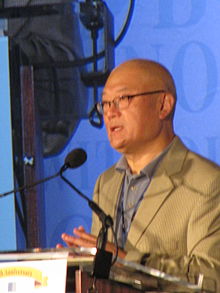Ha Jin
Ha Jin 哈金 | |
|---|---|
 | |
| Born | February 21, 1956 Liaoning, China |
| Pen name | Ha Jin |
| Occupation |
|
| Nationality | American |
| Education | Heilongjiang University (BA) Shandong University (MA) Brandeis University (PhD) |
| Genre | Poetry, short story, novel, essay |
| Subjects | China |
| Notable works | |
| Notable awards | List
|
| Spouse | Lisha Bian |
| Signature | |
 | |
| Ha Jin | |||||||
|---|---|---|---|---|---|---|---|
| Chinese | 哈金 | ||||||
| |||||||
| Jin Xuefei | |||||||
| Simplified Chinese | 金雪飞 | ||||||
| Traditional Chinese | 金雪飛 | ||||||
| |||||||
Jin Xuefei (simplified Chinese: 金雪飞; traditional Chinese: 金雪飛; pinyin: Jīn Xuěfēi; born February 21, 1956) is a Chinese-American poet and novelist using the pen name Ha Jin (哈金). The name Ha comes from his favorite city, Harbin. His poetry is associated with the Misty Poetry movement.[1]
Early life
[edit]Ha Jin was born in Liaoning, China. His father was a military officer; at thirteen, Jin joined the People's Liberation Army during the Cultural Revolution. Jin began to educate himself in Chinese literature and high school curriculum at sixteen. He left the army when he was nineteen,[2] as he entered Heilongjiang University and earned a bachelor's degree in English studies. This was followed by a master's degree in Anglo-American literature at Shandong University.
Jin grew up in the chaos of early communist China. He was on a scholarship at Brandeis University when the 1989 Tiananmen Square protests and massacre occurred. The Chinese government's forcible crackdown hastened his decision to emigrate to the United States, and was the cause of his choice to write in English "to preserve the integrity of his work." He eventually obtained a Ph.D. One of his mentors was literary critic Eugene Goodheart.[3]
Career
[edit]Jin sets many of his stories and novels in China, in the fictional Muji City. He has won the National Book Award for Fiction[4] and the PEN/Faulkner Award for his novel, Waiting (1999). He has received three Pushcart Prizes for fiction and a Kenyon Review Prize. Many of his short stories have appeared in The Best American Short Stories anthologies. His collection Under The Red Flag (1997) won the Flannery O'Connor Award for Short Fiction, while Ocean of Words (1996) has been awarded the PEN/Hemingway Award. The novel War Trash (2004), set during the Korean War, won a second PEN/Faulkner Award for Jin, thus ranking him with Philip Roth, John Edgar Wideman and E. L. Doctorow who are the only other authors to have won the prize more than once. War Trash was also a finalist for the Pulitzer Prize.
Jin currently teaches at Boston University in Boston, Massachusetts. He formerly taught at Emory University in Atlanta, Georgia.
Jin was a Mary Ellen von der Heyden Fellow for Fiction at the American Academy in Berlin, Germany, in the fall of 2008. He was inducted to the American Academy of Arts and Letters in 2014.
On July 28, 2021, an asteroid was named after him: (58495) Hajin.[5]
Awards and honors
[edit]- Flannery O'Connor Award for Short Fiction (1996)
- Hemingway Foundation/PEN Award (1997)
- Guggenheim Fellowship (1999)
- National Book Award (1999)[4]
- PEN/Faulkner Award (2000)
- Asian Fellowship (2000–2002)
- Townsend Prize for Fiction (2002)
- PEN/Faulkner Award (2005)
- Fellow of American Academy of Arts and Sciences (2006)
- Dayton Literary Peace Prize, runner-up, Nanjing Requiem (2012)[6]
- PEN Oakland Josephine Miles Literary Award for A Distant Center (2019)
Books
[edit]
Poetry[edit]
Short story collections[edit]
|
Novels[edit]
Biographies[edit]
Essays[edit]
|
See also
[edit]- Saboteur (short story) (2000)
References
[edit]- ^ A Brief Guide to Misty Poets Archived 2010-04-12 at the Wayback Machine
- ^ "Ha Jin" Archived 2010-01-31 at the Wayback Machine. Bookreporter.
- ^ "最会用英语写作的中国人哈金:没有国家的人-搜狐文化频道". cul.sohu.com. Retrieved 2022-05-26.
- ^ a b "National Book Awards – 1999" Archived 2018-11-24 at the Wayback Machine. National Book Foundation. Retrieved 2012-03-27.
(With acceptance speech by Jin and essay by Ru Freeman from the Awards 60-year anniversary blog.) - ^ WGSBN Bulletin vom 28. Juli 2021, Volume 1, #5, S. 11 (PDF; englisch)
- ^ Julie Bosman (September 30, 2012). "Winners Named for Dayton Literary Peace Prize". The New York Times. Archived from the original on 2012-10-02. Retrieved 2012-09-30.
- John Noell Moore, "The Landscape Of Divorce When Worlds Collide," The English Journal 92 (Nov. 2002), pp. 124–127.
- Ha Jin, Waiting (New York: Pantheon Books, 1999).
- Neil J Diamant, Revolutionizing the Family: Politics, Love and Divorce in Urban and Rural China, 1949-1968(Berkeley and Los Angeles: University of California Press, 2000), p. 59.
- Ha Jin, The Bridegroom (New York: Pantheon Books, 2000).
- Yuejin Wang, Chinese Literature: Essays, Articles, Reviews 13 (Dec. 1991).
- Ha Jin, "Exiled to English" (New York Times, May 30, 2009).
External links
[edit]- "Ha Jin, The Art of Fiction No. 202". The Paris Review (Interview). No. 191. Interviewed by Sarah Fay. Winter 2009.
- "The Bridegroom". Bookworm (Interview). Interviewed by Michael Silverblatt. KCRW. January 2001.
- Listen to Ha Jin on The Forum from the BBC World Service
- Boston University staff page
- Author interview in Guernica Magazine (guernicamag.com)
- Ha Jin audio interview re: A Free Life, November 2007
- Exiled to English
- Audio: Ha Jin in conversation on the BBC World Service discussion programme The Forum
- "Ha Jin's Cultural Revolution" - New York Times Magazine profile (2000).
- Ha Jin at Library of Congress Authorities — with 20 catalog records
- 1956 births
- Living people
- 20th-century American novelists
- 20th-century American poets
- 21st-century American novelists
- 21st-century American poets
- American male novelists
- American male poets
- American male short story writers
- American novelists of Chinese descent
- American short story writers of Chinese descent
- Boston University faculty
- Brandeis University alumni
- Chinese emigrants to the United States
- Chinese male novelists
- Emory University faculty
- Exophonic writers
- Flannery O'Connor Award for Short Fiction winners
- National Book Award winners
- PEN/Faulkner Award for Fiction winners
- Hemingway Foundation/PEN Award winners
- Postmodern writers
- Misty poets
- Shandong University alumni
- Heilongjiang University alumni
- Educators from Liaoning
- Poets from Liaoning
- Writers from Liaoning
- Novelists from Massachusetts
- Novelists from Georgia (U.S. state)
- 20th-century American male writers
- 21st-century American male writers
- Members of the American Academy of Arts and Letters
